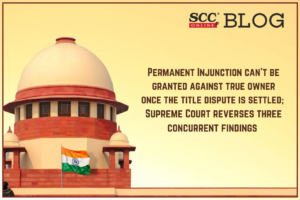Supreme Court: Reversing the concurrent findings of all the Court below in a case where the plaintiff was granted the relief of permanent injunction despite having lost the title, the bench of MR Shah* and BV Nagarathna, JJ has held that the plaintiff is not entitled to a relief of permanent injunction against the true owner once the dispute is settled and the plaintiff has lost the title.
The Court was deciding the case where the suit filed by the plaintiff for cancellation of the registered sale deed and declaration had been dismissed and the defendant was held to be the true and absolute owner of the suit land in question. The judgment and decree passed by the trial court in so far as refusing to grant the relief for cancellation of the registered sale deed and declaration had attained finality. Despite the fact that the plaintiff had lost the title, still the Courts below granted relief of permanent injunction against the defendant, the absolute owner of the land in question.
The Supreme Court found it unsustainable, both, on law as well as on facts as an injunction cannot be issued against a true owner or title holder and in favour of a trespasser or a person in unlawful possession.
The Court explained that an injunction is a consequential relief and in a suit for declaration with a consequential relief of injunction, it is not a suit for declaration simpliciter, it is a suit for declaration with a further relief. Whether the further relief claimed has, in a particular case as consequential upon a declaration is adequate must always depend upon the facts and circumstances of each case. Where once a suit is held not maintainable, no relief of injunction can be granted. Injunction may be granted even against the true owner of the property, only when the person seeking the relief is in lawful possession and enjoyment of the property and also legally entitled to be in possession, not to disposes him, except in due process of law.
In a given case, the plaintiff may succeed in getting the injunction even by filing a simple suit for permanent injunction in a case where there is a cloud on the title. However, once the dispute with respect to title is settled and it is held against the plaintiff, in that case, the suit by the plaintiff for permanent injunction shall not be maintainable against the true owner. In such a situation, it will not be open for the plaintiff to contend that though he/she has lost the case so far as the title dispute is concerned, the defendant – the true owner still be restrained from disturbing his/her possession and his/her possession be protected.
Applying the said principles to the case at hand, the Court observed that once the defendant was held to be the true and absolute owner pursuant to the registered sale deed executed in his favour and the plaintiff was unsuccessful so far as the declaratory relief is concerned, thereafter, it cannot be said that there was a cloud over the title of the plaintiff and/or even the defendant. Therefore, the only relief which survived before the trial court was the consideration of relief of permanent injunction and having been unsuccessful in getting the relief of cancellation of the registered sale deed and the declaration thereof, the relief of permanent injunction could not have been granted by the trial court as well as by the first Appellate Court. The Court observed that the Gujarat High Court lost sight of this aspect in the second appeal.
The Court noticed that the High Court had not properly appreciated the distinction between a substantive relief and a consequential relief as it had held that in the instant case the relief of permanent injunction can be said to be a substantive relief. Finding this view to be erroneous, the Court explained that the main reliefs sought by the plaintiff in the suit were cancellation of the sale deed and declaration and the prayer of permanent injunction restraining defendant from disturbing her possession can be said to be a consequential relief. Therefore, the title to the property was the basis of the relief of possession.
“If that be so, in the present case, the relief for permanent injunction can be said to be a consequential relief and not a substantive relief as observed and held by the High Court. Therefore, once the plaintiff has failed to get any substantive relief of cancellation of the sale deed and failed to get any declaratory relief, and as observed hereinabove, relief of injunction can be said to be a consequential relief.”
Therefore, holding that the prayer for permanent injunction must fail, the Court said that the plaintiff cannot be said to be in lawful possession of the suit land, i.e., the possession of the plaintiff is “not legal or authorised by the law”, the plaintiff shall not be entitled to any permanent injunction.
The Court, hence, found that all the Courts below erred in granting permanent injunction in favour of the plaintiff and against the defendant, who is the true owner. It is to be noted that the Supreme Court is usually slow in interfering with the concurrent findings of the Courts below. However, in the case at hand, the Supreme Court reversed the findings of three Courts i.e. the Trial Court-decree, First Appellate Court, and the High Court.
[Padhiyar Prahladji Chenaji v. Maniben Jagmalbhai, 2022 SCC OnLine SC 258, decided on 03.03.2022]
*Judgment by: Justice MR Shah
Counsels
For Original Defendant: Senior Advocate Pallav Shishodia and Advocate Rishabh Sancheti
For Original Plaintiff: Advocate Rauf Rahim

